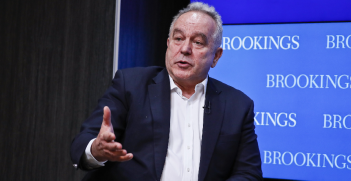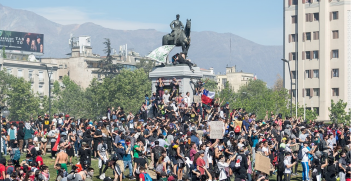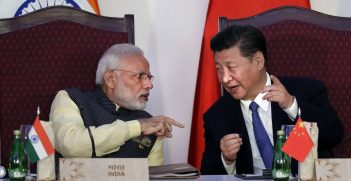Extradition Bill Aborted, But Civil Unrest Escalated – Who Pulled The Political Trigger? And Now What?

Despite the withdrawal of the Extradition Bill, the unrest continues and has escalated into widespread violence, culminating in the siege of the Hong Kong Polytechnic University. With the city now in tatters, it is essential that the violence stops and the city be rebuilt under “One country, two systems.”
It’s been nearly six months since the initial protests in Hong Kong were ignited by the Extradition Bill. The Bill would have allowed for the special administrative region’s (SAR) criminal suspects to be extradited to mainland China, raising concerns over the possibility of unfair trials and violent treatment of criminals by the central state along with an increase in Beijing’s influence over Hong Kong. Although Carrie Lam finally announced that the Bill was “dead” in September, this was perceived as “too little, too late” by some of the protesters who, at this stage amplified their demands as a consequence of their anger towards a government who had arrested them and labelled their protests as “riots,” and the police who had treated them unfairly. The disputes are rooted in the protesters’ distrust of the government and a strong desire to maintain the city’s British legacy of democracy rather than a form of democracy that follows a direction dictated by the PRC. Unsurprisingly, when the clashes increased, the demands of the protesters shifted from the Extradition Bill to a political quest for civil liberty and universal suffrage, which had not been fully achieved based on the 1984 Sino-British Joint Declaration and the 1997 Basic Law of Hong Kong under the framework of “One Country, Two systems.” Beijing, however, did not respond sympathetically to this appeal, and instead promoted pro-Beijing rallies in Hong Kong, which brought about new waves of tit-for-tat violent demonstrations in the city and domino-rallies in the UK, France, the USA, Canada, and Australia in support of Hong Kong.
The escalation subsequently caused chaos, injuries and the deaths of innocent citizens in Hong Kong and reached fever pitch in the Hong Kong Polytechnic University where student protesters were barricaded inside the campus by police force. The campus became a “war zone” surrounded by tear gas, petrol bombs, arrows, water cannons, armoured trucks, and augmented by the radicalism of “young soldiers.” Finally, a negotiated surrender organised by parents, school staff and local politicians provided the means for the situation to subside. These youth-led demonstrations bring to mind the May Fourth rallies in 1919 and China’s dark history concerning the June Fourth Incident (known in the West as the Tiananmen Square protests) in 1989, as both parallel the current political crisis in Hong Kong in terms of student radicalism and their quest for democracy and government accountability. However, the key difference is that this post-Umbrella Movement in Hong Kong was not forged by citywide solidarity. It is also worth noting that the Hong Kong protests involved students, teenagers, and even toddlers who had little or no idea about the protests and why they were protesting. They stormed into the legislative council, burned the Chinese flag and raised the American flag in a plea for help, destroyed public infrastructure, attacked innocent people in public spaces, and chanted slogans such as “Restore Hong Kong, the revolution of our times,” and “Hong Kong is not China.” Such blind radicalism/assertiveness accompanied by violence symbolises a newfound social and political consciousness among Hong Kong students in recent years. However, this is not the best solution to achieving democracy. It can only damage Hong Kong as such violent behaviour discredits democracy and may weaken the city’s probability in obtaining support from the international community.
To Beijing, the slogans were seen as indicative of separatism and alluding to the foreign-orchestrated “colour revolution” that took place in the former Soviet countries in the 2000s leading to the overthrow of the government. Despite the “riots” and “division of China’s unity,” and despite China insisting that Hong Kong’s turmoil is an “internal affair” in which foreign countries must not interfere, President Xi is unlikely to resort to a military crackdown to quell the unrest as this could create tensions with Western democratic nations and at worst, ignite war between China and the US, the UK, and their allies. Meanwhile, Beijing is also conscious that a repetition of “June Fourth” would bring international condemnation down on China, and this could have dire consequences. The passing of the Hong Kong Human Rights and Democracy Act by the US House of Representatives has consolidated the US’s support for Hong Kong’s fight for freedom and this will undoubtedly complicate China-US relations and add further complexities/uncertainties to Hong Kong’s status and its identity. If the “conspiracy theory” that suspects western countries of intending to bring about disorder in China has an element of truth, it is essential that international politics are not played out at the expense of Hong Kong.
The lengthy turmoil has burdened Hong Kong with enormous social, economic and human costs, and it’s time for both the Beijing and Hong Kong governments to reflect on the incident and reconcile their dispute over the level of autonomy that should prevail in the city and review the understanding of the “One country, two systems” principle. It’s imperative that the pro-democracy leaders step in and save Hong Kong by urging the protesters to cease violent demonstrations, abandon their provocative slogans and modify their “five demands.” It’s also important for the Hong Kong government to take the accusations of political brutality seriously as using violence against violence will not safeguard the city and will undoubtedly weaken the “One country, two systems” solution. Given the social-economic stratification in Hong Kong has already weakened its citizens’ trust and confidence in the government, it is possible the political crisis may further enhance such distrust and tear the city apart. Meanwhile, independent investigations into the allegations of political brutality are necessary to mitigate tragedies and return justice to the citizens of Hong Kong. As for the citizens of Hong Kong, it’s essential they are more understanding of the difficulties faced by their government as the SAR needs to juggle between Beijing’s ruling and the protection of the interests of Hong Kong citizens. A reflective and concessive approach at each end of the spectrum will help Hong Kong to regain momentum and hope.
Dr Pan Wang is a senior lecturer in Asian and Chinese Studies at the University of New South Wales.
This article is published under a Creative Commons Licence and may be republished with attribution.





